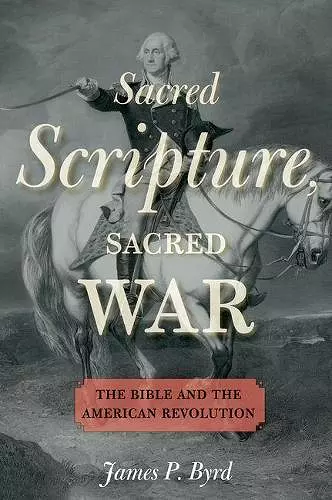Sacred Scripture, Sacred War
The Bible and the American Revolution
Format:Paperback
Publisher:Oxford University Press Inc
Published:14th Sep '17
Currently unavailable, and unfortunately no date known when it will be back
This paperback is available in another edition too:
- Hardback£40.49(9780199843497)

Winner of an Award of Merit in the Christianity Today Book Awards, History/Biography category On January 17, 1776, one week after Thomas Paine published his incendiary pamphlet Common Sense, Connecticut minister Samuel Sherwood preached an equally patriotic sermon. "God Almighty, with all the powers of heaven, are on our side," Sherwood said, voicing a sacred justification for war that Americans would invoke repeatedly throughout the struggle for independence. In Sacred Scripture, Sacred War, James Byrd offers the first comprehensive analysis of how American revolutionaries defended their patriotic convictions through scripture. Byrd shows that the Bible was a key text of the American Revolution. Indeed, many colonists saw the Bible as primarily a book about war. They viewed God as not merely sanctioning violence but actively participating in combat, playing a decisive role on the battlefield. When war came, preachers and patriots alike turned to scripture not only for solace but for exhortations to fight. Such scripture helped amateur soldiers overcome their natural aversion to killing, conferred on those who died for the Revolution the halo of martyrdom, and gave Americans a sense of the divine providence of their cause. Many histories of the Revolution have noted the connection between religion and war, but Sacred Scripture, Sacred War is the first to provide a detailed analysis of specific biblical texts and how they were used, especially in making the patriotic case for war. Combing through more than 500 wartime sources, which include more than 17,000 biblical citations, Byrd shows precisely how the Bible shaped American war, and how war in turn shaped Americans' view of the Bible. Brilliantly researched and cogently argued, Sacred Scripture, Sacred War sheds new light on the American Revolution.
Richly researched and drawing from copious amounts of primary material, Byrd's work opens up a previously undiscovered world to those seeking to understand the complicated relationship between America, war, and the Bible. This should be required reading for all those interested in understanding the congregational and hermeneutic roots of America's long love affair with both war and Scripture. * Myles Merntz, The Englewood Review of Books magazine *
This is a well-written and fascinating book that sheds new light on the role of religion in the American Revolution. No one has analyzed the revolutionary sermon in this kind of detail before. * Suzanne Geiss, Anglican and Episcopal History *
Marvelously researched and historically compelling an achievement of the first order. * Reviews in American History *
Short but potent It will be foundational for all future studies of the Bible and the American Revolution, and it will be of great interest and relevance for broader studies of religion in late colonial America. * Reviews in History *
Excellent and trailblazing It is impossible to do justice to the richness of the book's findings and insights in a short review fascinating, important, and insightful. * Journal of American History *
With its remarkable research and deft insights, Sacred Scripture, Sacred War represents a major breakthrough in the study of religion and the American Founding. Never before have we had such a systematic investigation of how the Patriots actually used the Bible. Anyone interested in the Revolution will have to contend with Byrd's book. * Thomas S. Kidd, author of God of Liberty: A Religious History of the American Revolution *
Historians believe they know why Founders such as John Adams and Thomas Jefferson became revolutionaries, but the reasons why most common people supported the American Revolution, and were willing to fight and die for American independence, has remained something of an enigma. By studying how the Bible and the clergy inspired patriotism, historian James Byrd has provided answers that unravel some of the mystery. Byrd has written a good and important book that enriches our understanding of the American Revolution. * John Ferling, author of Independence: The Struggle to Set America Free *
It is no secret that the Bible is the quintessential text in American political and cultural history. Its cadences soar in presidential addresses and in America's greatest novels. Until recently, the central role the Bible has played in American wars has been less clear. Now, thanks to James Byrd, scholars have a thoroughly narrated index of the American Revolution that shows just how pervasive the Bible was to patriots pursuing their war for independence. Richly detailed and beautifully written, this book makes a major contribution to the literature on America's religious destiny, which was forged in the travail of revolution. * Harry S. Stout, author of The New England Soul: Preaching and Religious Culture in Colonial New England *
By far the most comprehensive analysis ever undertaken of how revolutionary Americans defended their patriotic convictions through scripture." - Christianity Today
Byrd mines his dataset of wartime sermons during the long eighteenth-century to great effect...adds immeasurably to our understanding of the Bible's function during wartime and the ways in which American patriots understood the Revolution." - Religion in American History
A convincing, first systematic analysis of how early American preachers and authors used the Bible to interpret Americans' engagement in war... Recommended. * CHOICE *
Sacred Scripture, Sacred War is a milestone in understanding Christianity in the American Revolution."-Fides et Historia
- Winner of ^BWinner of an Award of Merit in the ^IChristianity Today^R Book Awards, History/Biography category^R.
ISBN: 9780190697563
Dimensions: 155mm x 231mm x 15mm
Weight: 363g
258 pages